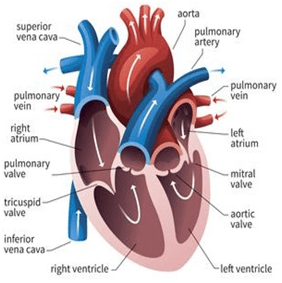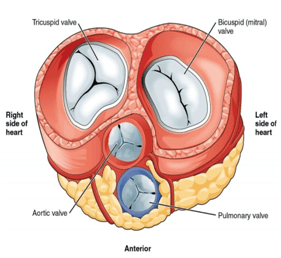Heart Valve Replacement Surgery
HOW THE HEART WORKS?
A healthy heart beats approximately 100,000 times a day. The heart’s job is to supply the body with oxygen-rich blood. The heart has four chambers. Blood is pumped through the four chambers and the four heart valves. Valves between each of the heart's pumping chambers keep blood flowing forward through the heart.

WHAT HEART VALVES DO?
Heart valves open when the heart pumps to allow blood to flow. They close quickly between heartbeats to make sure blood does not flow backward. Any trouble in this normal flow pattern will make it hard for the heart to pump the blood where it needs to go.

Pulmonic Valve: Controls the flow of blood to the lungs to get oxygen.
Aortic Valve: Controls the flow of blood as it exits the heart and is pumped to the rest of the body.
Mitral and Tricuspid Valves: Control blood flow as it moves between the chambers of the heart.
HEART VALVES DISORDER
Severe valve damage means the valve must get replaced and most frequently involves the aortic or mitral valve. It also treats any valve disease that's life-threatening. Some patients may need more than one valve to be fixed or replaced.
The mitral and aortic heart valves are commonly affected by two main types of conditions:
Reasons for Heart Valve Replacement Surgery
Regurgitation (leakage of the valve): The valve does not fully close, causing blood to flow backward. This forces the heart to pump more blood on the next beat, making it work harder.
Stenosis (narrowing of the valve): The opening of the valve narrows, limiting the flow of blood out of the heart’s chambers. This causes the heart to pump blood with increased force in order to move blood through the narrowed or stiff (stenotic) valve.
“When the mitral and aortic heart valves fail to open and close properly, the heart's ability to pump blood adequately through the body is hampered. The implications for the heart can be serious and this issue can lead to a variety of complications, including heart failure
Surgical alternatives for heart valve replacement include:
- Mechanical valve — a long-lasting valve made of durable materials
- Tissue valve
- Ross Procedure — “Borrowing” your healthy valve and moving it into the position of the damaged valve aortic valve and replacing the “borrowed” valve with a new valve.
- TAVI/TAVR procedure — Transcatheter aortic valve implantation/transcatheter aortic valve replacement
The method selected will rely upon the valve that needs replacement, the severity of signs and symptoms and the severity of surgery. Some processes can also additionally require long-time period medicine to treat against blood clots. You have alternative options available while selecting a heart valve as per doctor’s guidance.
REPAIRING THE MITRAL VALVE
Many surgical techniques are available to repair the mitral valve to enable it to open and shut efficiently.
Decalcification to remove calcium and improve valve mobility
Repair of the fibrous strings that support the valves
Ring annuloplasty tightens the ring-like structure (the annulus) that supports the valve by inserting an artificial ring made of metal, tissue or cloth around the valve
Patching holes to stop valve leakage
Reshaping the leaflets to allow the valve to open and close more effectively
Commissurotomy to open a narrowed valve
REPAIRING THE AORTIC VALVE
Aortic valve repair and aortic valve replacement can be accomplished thru conventional open-coronary heart surgery, which includes a cut (incision) in the chest, or through the usage of minimally invasive methods, which contain smaller incisions inside the chest or a catheter inserted in the leg or chest.
Minimally invasive heart surgery has its own benefits like shorter hospital stay, faster recovery and less discomfort than conventional open heart surgery.
What type of treatment you have depends on your particular case, and the advantages and disadvantages of each choice will be clarified by your doctor. Some individuals with aortic valve disease, for example, may not be candidates for conventional openheart surgery because of other health issues that may make the operation too risky, such as lung or kidney disease.
In order to increase blood flow, many people with aortic valve disease may have coronary artery disease and will require heart bypass surgery. Heart bypass surgery is typically done by conventional open-heart surgery, but the same operation can be performed on your aortic valve procedure.
Heart Valve Replacement Procedure
REPLACING THE MITRAL VALVE
A damaged mitral valve can be replaced with either a mechanical valve, or a biological valve.
Mechanical valves are made of durable synthetic materials such as titanium and pyrolytic carbon. They last approximately 30 years, and recipients must take lifelong blood thinning medications (e.g., Coumadin or Warfarin). A mechanical valve is typically recommended for individuals 50 years or younger.
Biological valves are made from animal tissue (cow or pig). They last approximately 10 to 15 years, and patients do not require long-term blood thinning medications. A biological valve is recommended for those 65 or 70 and older.
Repairing the Aortic Valve with Heart Replacement Surgery
Several surgical techniques are available to tighten or loosen the aortic valve, so that the valve functions properly. Aortic valve repair can include surgical valvuloplasty to repair valve cusps so that it opens and closes more effectively.
Replacing the Aortic Valve with Heart Replacement Surgery
With aortic valve replacement surgery, the faulty valve is removed and replaced with an artificial valve. The decision to choose a mechanical or biological aortic valve depends on the unique needs of each patient.
SYMPTOMS OF AORTIC REGURGITATION
May not have any symptoms for years
Fatigue
Shortness of breath
Swollen ankles and feet
Rapid or irregular pulse
SYMPTOMS OF MITRAL VALVE REGURGITATION
Many people with severe mitral valve regurgitation may not have symptoms, yet may still benefit from early mitral valve repair.
Signs and symptoms of mitral valve regurgitation can include:
Blood flowing turbulently through your heart (heart murmur)
Shortness of breath, especially with exertion or when you lie down
Fatigue, especially during times of increased activity
Heart palpitations- sensations of a rapid, fluttering heartbeat
Swollen feet or ankles
How do I get ready for heart valve repair or replacement surgery?
The process will be clarified by your healthcare provider and you may ask questions.
You will be asked to sign a consent form to do the surgery that gives your permission. Read the form carefully and, if anything is ambiguous, ask questions.
Your healthcare provider can do a complete physical examination along with a complete medical history to ensure that you are otherwise in good health prior to surgery. Blood tests or other medical tests might be appropriate for you.
Before the operation, normally after midnight, you will be asked to fast (not eat or drink) for 8 hours.
Tell your healthcare provider if you are pregnant or think that you might be.
Tell your healthcare professional whether you are susceptible to drugs, iodine, latex, paper, or anesthetic agents or are allergic to them (local and general).
Be sure that your healthcare provider knows all the medications you are taking (prescription and over-the-counter), vitamins, herbs, and supplements.
If you have a history of bleeding disorders or if you are taking some anticoagulant (blood-thinning) drug, aspirin, or other drugs that influence blood clotting, inform your healthcare provider. Before surgery, you can be advised to quit any of these drugs.
Prior to surgery, your healthcare provider can do a blood test to see how long it takes for your blood to clot.
If you have a pacemaker or some other implanted cardiac equipment, notify your healthcare provider.
Stop smoking as soon as possible if you smoke. This increases the likelihood of a full surgical recovery and benefits your overall health status.
Your healthcare provider can require other unique preparations, depending on your medical condition.
Life After Heart Valve Replacement
Most valve repair and replacement operations have been successful. A valve repair may fail in some rare cases and another operation may be required. In 10 to 15 years, patients with a biological valve may need to have the valve replaced. Mechanical valves can also malfunction, so if they have any signs of valve failure, patients should warn their doctor.
For the rest of their lives, patients with a mechanical valve would continue to take a blood-thinning drug. Since these medications raise the risk of bleeding inside your body, you should always wear a medical warning bracelet and inform your doctor or dentist that you are taking a blood-thinning drug.
